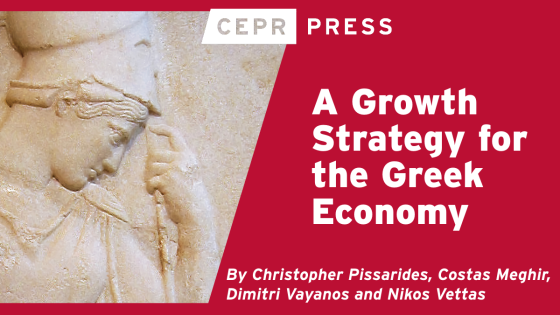A week ago, Britain voted to exit the European Union. Most commentators expect the British government to respect the outcome of the referendum. After Prime Minister David Cameron steps down in the autumn, the new government is expected to initiate Brexit by invoking Article 50 of the Lisbon Treaty.
Yet the outcome of the Brexit referendum is not legally binding. In principle, the new government could delay Article 50 indefinitely. In fact, one year ago another European government, the Greek government, chose to disregard the outcome of another seismic referendum. What happened in Greece?
The Greek referendum
In the spring of 2015, Greece negotiated with its public creditors over a potential bailout without which Greece would likely be forced to exit the Eurozone. On 25 June, the creditors presented an ultimatum to the Greek Prime Minister Tsipras, offering bailout funds in exchange for major reforms. Tsipras rejected the offer and announced a referendum on the bailout for 5 July. During the short campaign, Tsipras campaigned for a “no” vote. He was successful – in the referendum, 61% of Greek voters rejected the bailout offer. Yet just a few days later, on 13 July, Tsipras accepted a new bailout package whose terms were even harsher than the terms he had rejected a couple of weeks earlier.
These developments appear difficult to understand at first. Why did Tsipras call a referendum and then, after winning it, reject its outcome? Why did he end up accepting tougher bailout terms? Most commentators invoke some combination of irrationality and political posturing. According to Philippon (2015), “[t]he 2015 elections and the ensuing negotiations, however, had nothing to do with economics. It was pure political theatre on both sides.”
That could very well be right. But the main purpose of this column is to propose a simple economic explanation of these developments.
A rational story
In this explanation, both sides in the negotiations – the Greek government and its creditors – are fully rational, but neither of them knows how costly Grexit would be to Europe. Information about the cost of Grexit is symmetric, in that both sides are equally well informed, but it is imperfect, in that neither side knows exactly how much Europe would be hurt if Greece were to exit the Eurozone. This assumption seems plausible since there is no historical precedent of a country leaving the Eurozone.
The unknown cost of Grexit determines the bargaining power in the bailout negotiations. Both sides know that if the cost of Grexit to Europe is high, then the Greeks’ bargaining power is high as well. But if the cost of Grexit is low, so is the Greeks’ bargaining power.
One potential source of additional information about the cost of Grexit is financial markets. Market prices aggregate information across many sophisticated participants. Therefore, markets are likely to know more about the cost of Grexit than either side in the bailout negotiations. But to find out what markets think, you have to ask them first.
The referendum experiment
So what happened? The austerity-laden bailout offer proposed by the creditors on 25 June was unacceptable to Tsipras on political grounds. If he were to accept the offer, he would most likely lose the next election because he campaigned on the platform of fighting austerity.
To improve his expected outcome, Tsipras decides to conduct an experiment. He calls a referendum on the bailout, thereby increasing the probability of Grexit. To further raise the probability of Grexit, he campaigns for a “no” vote. The purpose of the experiment is to elicit information about the true cost of Grexit by observing the reaction of financial markets. Since markets know more about the cost of Grexit than either side, the market response to the increase in the probability of Grexit should provide an additional signal about this cost. Tsipras hopes that markets will drop like a stone, indicating that the cost is high.
That is what happened in Greece four years earlier in similar circumstances. On 27 October 2011, European politicians announced a bailout deal cutting Greece’s debt in half. But early in the following week, Greece’s Prime Minister Papandreou announced his intention to hold a referendum on the bailout. After his announcement, European stocks fell by about 5%, presumably in response to the increased likelihood of Grexit. The 2011 referendum never happened because other politicians quickly stopped Papandreou’s initiative (resulting in a stock price rebound). But the fact that stocks dropped sharply after the initial announcement must have reflected the market’s perception of a high cost of Grexit in 2011.
Four years later, Tsipras was hoping for a similar outcome. If markets had collapsed in response to his referendum, his bargaining power would have strengthened, and he might have been able to negotiate a better deal for Greece.
A failed gamble
Unfortunately for Tsipras, that did not happen. The euro barely budged and the stock market reaction was more modest than in 2011. After the negative outcome of the referendum was announced, European stocks fell by only 1.2%. The weaker market response signalled that the cost of Grexit had declined between 2011 and 2015, perhaps due to the introduction of new programmes in the Eurozone such as the ECB’s Outright Monetary Transactions and the European Stability Mechanism. The muted market reaction weakened Tsipras’ hand. When he returned to the negotiating table, a new tougher proposal awaited him because the creditors understood from the market response that Tsipras’ bargaining power has weakened.
The above story can jointly explain why Tsipras called his referendum, why he campaigned for a “no” result, why he disregarded the referendum’s outcome despite being on the winning side, and why he ended up with a worse deal than the one rejected in the referendum. Of course, other stories about these events can be told, and I do not claim to have the best one. My verbal model is parsimonious but certainly not exactly true; the reality is always more complicated than any economic model.
The cost of Brexit
Now let’s move from Grexit to Brexit. Can we learn anything about the cost of Brexit from the market reaction to the Brexit vote?
The reaction was strong and immediate: the pound lost about 10% against the dollar, and stocks dropped sharply. But one week after the referendum – as of this writing – stocks have recovered somewhat. In fact, the FTSE 100 index of the largest British firms is already 3% above its pre-referendum level. In contrast, European stocks are still down 4%. Can we thus conclude that Brexit is a non-event for Britain but a blow to the rest of Europe?
Not really. First of all, many of the FTSE 100 firms are multinationals poised to benefit from the cheaper pound. The more domestically oriented FTSE 250 index, which contains the 101st through 350th largest firms listed on the London Stock Exchange, is still down more than 5% (after being down more than 13% earlier in the week). Second, and more important, looking at percentage changes in stock index levels ignores the 10% drop in the pound. In dollar terms, British stocks have dropped significantly, more so than European stocks.
The market reaction suggests that the cost of Brexit is significant for both Britain and the rest of Europe. Nonetheless, it also suggests that the government will respect the Brexit vote. Had markets collapsed, indicating a gigantic cost of Brexit, a second Brexit referendum might have been on the cards. But the observed drops do not qualify as a collapse, making a repeat referendum unlikely.
Broader implications
These examples clearly demonstrate that political decisions exert significant effects on asset prices. We need new economic theory to help us understand those effects. In work with co-authors, I have already made some progress (Pastor and Veronesi, 2012, 2013, Kelly et al. 2016). In our work, political news moves asset prices, and political uncertainty commands a risk premium whose magnitude is larger in weaker economic conditions. We plan to conduct more work in this area.
References
Philippon, T. (2015), “The state of the monetary union”, working paper, NYU Stern.
Kelly, B., L. Pastor and P. Veronesi (2016), “The price of political uncertainty: Theory and evidence from the option market,” Journal of Finance, forthcoming.
Pastor, L. and P. Veronesi (2012), “Uncertainty about government policy and stock prices,” Journal of Finance 67, 1219-1264.
Pastor, L. and P. Veronesi (2013), “Political uncertainty and risk premia,” Journal of Financial Economics 110, 520-545.



